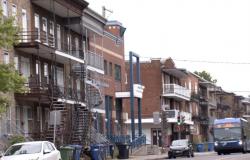One of the most ardent promoters of Montreal nightlife is leaving the metropolis. Mathieu Grondin, founder of the organization MTL 24/24, has just been appointed nightlife commissioner for the City of Ottawa, who is seeking to extend the opening hours of bars and performance halls to small hours of the morning.
This tireless activist for night activities will continue in the federal capital the battle he has been waging for years to promote the growth of nightlife in Montreal. Ottawa Mayor Mark Sutcliffe made the announcement on Tuesday, flanked by his new commissioner recruited from Quebec.
Mathieu Grondin and other big names in Montreal’s cultural life have long recommended the creation of a position of “night mayor” or nightlife commissioner to make the metropolis a city that never sleeps – like Berlin , New York or Amsterdam.
“Ottawa becomes the first city in Canada to have a nightlife commissioner. We find it a shame that it’s not Montreal,” reacted Jenny Thibault, general director of the Society of Technological Arts (SAT).
She finds it “unfortunate” that Mathieu Grondin has to go into exile to implement the vision he wanted for Montreal. This actor, director and DJ, now 44 years old, co-founded MTL 24/24 in 2017 in the hope of eliminating the “unfavorable prejudice” that reigns in the city against nightlife.
The actions of MTL 24/24 have advanced nighttime activities, but Mathieu Grondin was becoming more and more critical of the administration of Valérie Plante, who is slow to move from words to action to promote nightlife, according to him.
In January 2024, the City of Montreal ended funding for MTL 24/24. Mathieu Grondin found himself unemployed. And it is the federal capital, and not Montreal, which has relied on its expertise to stimulate nightlife.
Disturbing noise
The metropolis has been renowned for nearly a century for its wild nights, but this success story remains unfinished: cohabitation is difficult between certain night-time institutions and their neighbors, who complain of losing sleep because of the noise. And it only takes one resident to complain to cause a bar to close.
Mayor Valérie Plante has committed to table a nightlife policy by fall 2024 intended to make Montreal an international-caliber night city. A commission made up of Montreal municipal officials recommended in April the establishment of a nightlife commissioner (or office) with staff and a budget.
This commissioner would have the particular mission of arbitrating conflicts between bars or performance halls and their neighborhoods. Nightlife zones would allow bars to serve alcohol after 3 a.m. The tolerated noise level may vary from one neighborhood to another.
The latest arrivals in an area would have the responsibility to adapt to their environment: for example, a resident who comes to settle next to a bar would have to tolerate the noise. Housing developers in the Quartier des spectacles should install sound-proofing windows. And performance halls should soundproof their walls so as not to inconvenience their neighbors.
“Stop demonizing the night”
The cultural and business communities are impatiently awaiting the nightlife policy in Montreal. The SAT is one of the night establishments which have been the subject of noise complaints in recent months. The organization, which has been established in the Quartier des spectacles for nearly three decades, has invested to limit the sound impact of its multimedia events.
The SAT is participating in a City pilot project which aims to evaluate — and possibly relax — the “zero tolerance” rule for noise. Technicians come regularly to measure the noise level at the SAT and its neighbors, to determine acceptable thresholds.
“We are optimistic. We hope that with the nightlife policy, we will stop demonizing the night,” says Jenny Thibault, director of the SAT.
In recent years, the SAT has been able to extend the party at least four times well beyond the usual time of last call. One of these “parties” even started at 10 p.m. on a Saturday evening and ended on Monday morning. Everything went well. People don’t need to rush to drink before the service ends at 3am. And when they leave the room, after sunrise, the metro and the buses have started running again.
To watch on video
#Canada






